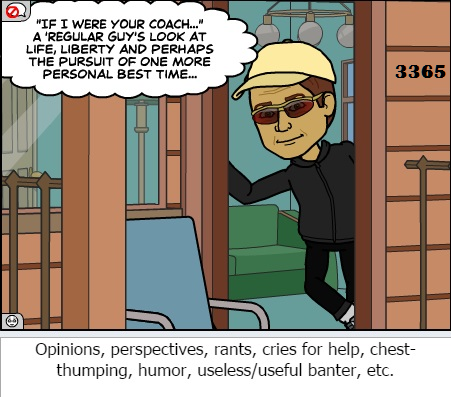 Sounds like the kind of place I want to spend some time in this time next year. Ah, but that will depend mostly on the wishes of COMNAVWIFELANT, also known as "Mrs. Java," "Coffee-Mate," or..."she who must be obeyed."
Sounds like the kind of place I want to spend some time in this time next year. Ah, but that will depend mostly on the wishes of COMNAVWIFELANT, also known as "Mrs. Java," "Coffee-Mate," or..."she who must be obeyed."Fortunately for me, this years' endurance challenges smoothly segued into:
1. a reasonable level of training, namely the building of a right solid base, and
2. my wife's wish to run another half-marathon after a year's hiatus from systematic training.
So, I took the challenge of being husband and coach all at the same time...again...and got her back into the run training regimen she had a couple of years ago. Suzanne's strength is the ability to (like the Energizer Bunny) go for a consistent pace over an extended period of time. Brute, blistering speed is not her forte.
The biggest challenge for her, unfortunately, is the fact she is one of the few at her ability level who enjoys doing what I like to assign (to my athletes); moderate-distance training sessions of up to an hour two-or-three times a week, with speed work once-or twice a week. Oh, yes, don't forget the run of at least an hour once a week. That means she spends a lot of time doing her workouts alone. At least I can find someone within 30 seconds/mile pace to run with me...most of the time. However, since the middle of last month I've made a conscious effort to run easy with her at least once a week.
Don't know how many of you have ever tried to run a minute-to-two minutes/mile slower than your average training pace, but it can be a little painful. Especially after 60 minutes. I dreaded the prospect of those first runs at such a sedate pace, remembering vividly the damage I did to myself along Waikiki a couple of years back. All right, I have to admit part of the problem had to do with the fact I was in very old running shoes...and had recently done damage to my achilles at the beach half-marathon.
But once I figured out how to do the right thing - run for a period of time/distance, then turn and run back to my wife - everything went well. As it was, she was never really more than about two blocks back from me over the course of a single mile, so I could gently jog back. It also allowed her to know the exact route which we were going to use for a six-mile run, or an eight-mile run, or what the route for the distance she needed to cover was going to be (GPS plus Google Maps equals a very good estimate of how far you've gone.).
This particular attitude persisted over the last month, with other runners who are a little faster than my wife also benefiting from the small change in my training regimen. As they've come out they've had the opportunity to learn the loop we train on & build their confidence.
So, what has it done to my speed? Well, I ratcheted up the pace the other night on the beach, doing a 6.2-mile loop. The first mile or two were in the 7:30/mile pace, after that the splits started to come down between 5-and-7 seconds a mile, until I was running the last two miles in the high-six minute/mile range. Yes, it hurt. But it was a good hurt. I hadn't been at that particular pace for about two, or maybe three, months. But I also hadn't done any real speed work since September, either.
So, if you want to develop speed you need to learn how to run comfortably at speed. But once you've learned how it feels, you can't be hurt by emphasizing the runs which maintain base fitness.























